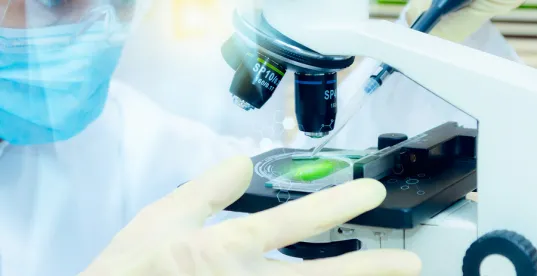The current COVID-19 environment has disrupted standard operations in nearly every industry and created fertile grounds for innovation. This is the first of a series of blog posts that will look at how industries have enabled technologies at lightning speed, in an effort to pay homage to the wonders of science innovation in view of COVID-19.
Many universities have been able to create or shift research projects to tackle immediate problems related to COVID-19. For example, a multi-disciplinary team at UCLA developed 3D-printed, reusable, durable face shields. The face shield’s headband can be mass-produced using 3D injection molding, and the clear plastic shield can be mass-produced by laser cutting. The face shield is compatible with most hospital-grade disinfectants and has been shared on the National Institutes of Health (NIH)’s 3D print exchange, making the device model available online to be 3D-printed anywhere with access to a compatible 3D printer.
Also at UCLA, scientists have developed and tested a portable, tabletop-size device to kill bacteria and viruses on N95 surgical masks as well as other PPE and medical equipment. The device does not use chemicals or radiation, operates at a low temperature to maintain the integrity of the medical equipment, and works to kill the bacteria in 90 seconds. Single-use medical equipment can potentially be reused. In other embodiments of the technology, the device can retrofit HVAC systems in commercial buildings to remove hazardous airborne particles from circulating in a building.
Universities are also leveraging existing relationships to solve immediate problems related to COVID-19. For example, a group of Caltech scientists and JPL engineers created a simplified, low-cost ventilator device to combat Acute Respiratory Distress Syndrome (ARDS) caused by COVID-19. The device is called Ventilator Intervention Technology Accessible Locally, or “VITAL,” and is designed only using parts that would not disrupt manufacturing of standard, full-featured ventilators. The device also minimizes the number of mechanical and electronic components to reduce the overall cost of mass production, as well as minimize the time to assemble and deliver working units to people in need.
Several universities, including UCLA and USC, have signed on to licensing guidelines developed by AUTM. These guidelines offer time-limited, non-exclusive royalty-free licenses for these types of innovations. The AUTM guidelines link innovators with manufacturers and suppliers, and require that licensees commit to rapidly making and broadly distributing the products to prevent, diagnose, treat, and contain COVID-19. Licenses may subsequently convert to a more typical commercial license, as appropriate.
University researchers are working hard to fight COVID-19, and their efforts have been resulting in truly timely and important innovations for the current environment. Additionally, through the no-fee licensing agreements that these entities have arranged, the public could have access to these innovations at a low cost, helping improve access to those most at need.
Look out for our next posts paying homage to science and its work to save the day!



 />i
/>i

